

Matt U. (Section 90) - Wiki Education – Connecting Higher Ed and Wikipedia. Matt U. (Section 90) - Radical Teacher (University of Pittsburgh journal) UM Library Fake News Course - David Sastre, Section 90. The slides for the LOEX 2018 session entitled Fake News, Lies, and a For-credit Class: Lessons Learned from Teaching a 7-Week Fake News Undergraduate Library Course can be seen on the right.
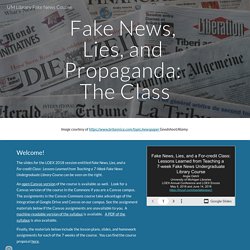
An open Canvas version of the course is available as well. Look for a Canvas version of the course in the Commons if you are a Canvas campus. The assignments in the Canvas Commons course take advantage of the integration of Google Drive and Canvas on our campus. See the assignment materials below if the Canvas assignments are unavailable to you. A machine-readable version of the syllabus is available. Finally, the materials below include the lesson plans, slides, and homework assignments for each of the 7 weeks of the course.
Young Adult Library Services Association (YALSA) Download the print version (PDF) or view the web version.
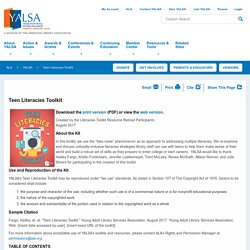
Created by the Literacies Toolkit Resource Retreat Participants August 2017 About the Kit In this toolkit, we use the “fake news” phenomenon as an approach to addressing multiple literacies. We re-examine and discuss culturally-inclusive literacies strategies library staff can use with teens to help them make sense of their world and build a robust set of skills as they prepare to enter college or start careers. YALSA would like to thank Hailley Fargo, Kristin Fontichiaro, Jennifer Luetkemeyer, Trent McLees, Renee McGrath, Allison Renner, and Julie Stivers for participating in the creation of this toolkit. Amy K. - S.O.S. for Information Literacy Boolean Logic Lesson. This is a 40 minute lesson that can take place in the library media center or the classroom.
If it takes place in the classroom, the database searching section of the lesson may need to be modified or omitted. Introduction. Guide to Research Small Business (Parth/90) ACRL Framework for Information Literacy Sandbox/Albie 90. Gallery Walk: What Shapes Information?/ Albie 90. I adapted this activity for a 100 minute first-year composition session.
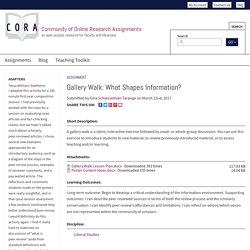
I had previously worked with the class for a session on evaluating news articles and fact-checking claims, but we hadn't talked much about scholarly, peer-reviewed articles. I chose several new examples appropriate for an introductory audience, such as a diagram of the steps in the peer-review process, examples of reviewer comments, and a pay-walled article. The reflections and comments students made on the posters were really insightful, and in their post-session assessment a few students mentioned they better understood peer-review. I would definitely do this activity again.
Gallery Walk: What Shapes Information? Wayfinding the Web Applying Critical Information Literacy to a Google Instruction Session (Chance) Rubric for assessing research questions CORA (Pete) Scholarly and Popular Sources (Matt) Library Database Teach-In CORA (Alyssa) Short Description: Rather than just providing a 20min presentation on academic databases available through the library website--this lesson is designed to have students demonstrate using library databases for their classmates. Information Literacy LibGuides at ACRL (Rebecca) Y Search (Danielle)
Travel Writing & Italy - Carroll University (Joshua) Guide on the Side (James) Many librarians have embraced the use of active learning in their teaching.
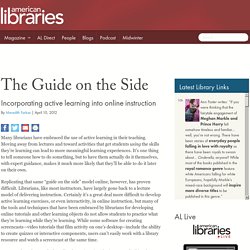
Moving away from lectures and toward activities that get students using the skills they’re learning can lead to more meaningful learning experiences. It’s one thing to tell someone how to do something, but to have them actually do it themselves, with expert guidance, makes it much more likely that they’ll be able to do it later on their own. Replicating that same “guide on the side” model online, however, has proven difficult. Search Smarter Search Faster: U. Sydney Library (Jason) Association of College and Research Libraries Standards for Proficiencies for Instruction Librarians and Coordinators. Revised as Roles and Strengths of Teaching Librarians, approved by the ACRL Board of Directors, April 28, 2017.
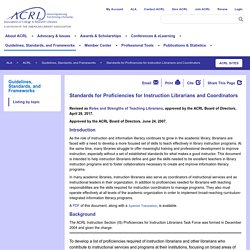
Approved by the ACRL Board of Directors, June 24, 2007. Introduction As the role of instruction and information literacy continues to grow in the academic library, librarians are faced with a need to develop a more focused set of skills to teach effectively in library instruction programs. At the same time, many libraries struggle to offer meaningful training and professional development to improve instruction, especially without a set of established standards for what makes a good instructor.
This document is intended to help instruction librarians define and gain the skills needed to be excellent teachers in library instruction programs and to foster collaborations necessary to create and improve information literacy programs. A PDF of this document, along with a Spanish Translation, is available. Background. Writing Commons CORA (Nikita) Writing Commons is an open education resource that helps students improve their writing, critical thinking, and information literacy.
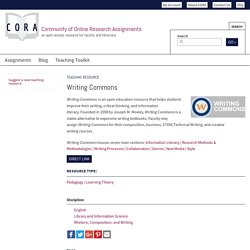
Founded in 2008 by Joseph M. Moxley, Writing Commons is a viable alternative to expensive writing textbooks. Faculty may assign Writing Commons for their composition, business, STEM/Technical Writing, and creative writing courses. Writing Commons houses seven main sections: Information Literacy | Research Methods & Methodologies | Writing Processes | Collaboration | Genres | New Media | Style. BooleanTableGame 2017LR (John) Goodbye, Boring Database Instruction. Hello, Search App Smackdown! (Ryan) Illustrations By Lars Leetaru Librarians are keenly aware of the value of teaching students to use databases.
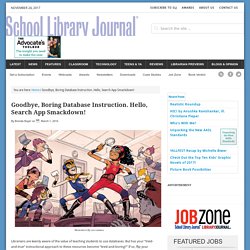
But has your “tried-and-true” instructional approach to these resources become “tired-and-boring?” If so, flip your instruction into a Search App Smackdown! This fun, challenging, and competitive gaming approach meets the American Association of School Librarians’ 21st-Century Learning Standards, skillfully integrating technology and standards by putting kids in the driver’s seat. First of all…databases? We know what they are, and why they’re important. Streaming Video: U.Kansas (Casey C.) Search Education – Google (Samantha) Searching Strategies (Amy L.)
Information Literacy LibGuides at ACRL (Rebecca/91) Locating Plays - Theatre & Performance Studies Research Guide - LibGuides@UMD Libraries (Casey C.) Search for Plays by Title (Use BASIC SEARCH) Strategy #1 - Title Beginning With...
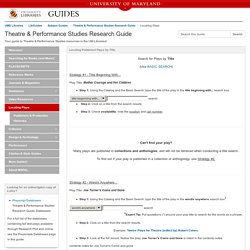
Play Title: Mother Courage and Her Children Step 1: Using the Catalog and the Basic Search; type the title of the play in the title beginning with... search box. Step 2: Click on a title from the search results. Can't find your play? Research Exploration Exercise. Short Description: This assignment is designed to help students develop a thoughtful research topic.
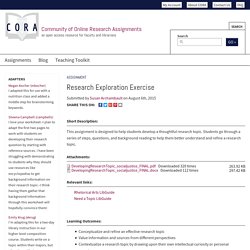
Students go through a series of steps, questions, and background reading to help them better understand and refine a research topic. Course Context (e.g. how it was implemented or integrated): Picking Your Topic. Meet Jennie.
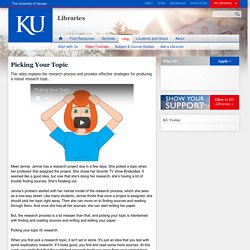
Jennie has a research project due in a few days. She picked a topic when her professor first assigned the project. She chose her favorite TV show Bridezillas. It seemed like a good idea, but now that she's doing her research, she's having a lot of trouble finding sources. Hacking the Research Library. Bruin Success with Less Stress (Tania)
This is a wonderful educational guide that is designed to "help educate UCLA students about their role in the academic community and to help them make informed choices." It includes sections on intellectual property, file sharing, citing and documenting sources, organizing research, and academic integrity. The tutorial is interactive and engaging, with its informal, conversational style and some fun quizzes along the way. It's well-organized so that users can either follow the tutorial from beginning to end or navigate directly to the section for which they need more immediate information, allowing them to customize their experience. The comprehensive guide contains easy-to-understand explanations of often complex topics and includes many links to both other pages within the guide and to useful external resources. I'm so impressed with both the content and design of this instructional guide and imagine that it's an incredibly helpful resource for students and faculty. – tmshelton
Twenty-First Century Informational Literacy (Lisa) ReadWriteThink couldn't publish all of this great content without literacy experts to write and review for us.
I can’t believe I have never seen this idea before...I LOVE it. When I taught high school English, I was always trying to think of fresh ways for students to demonstrate their knowledge and learning after performing research. For a while, feature articles were all the rage. I thought they were a good way for students to use research to create a very authentic, real-world final product. In this lesson, students study graphic novels and their format/techniques, then come up with a research topic to use to write their own graphic novels using online software. Graphic novels are high-interest reading for many students, and in my experience, many students do not realize the many excellent examples of nonfiction graphic novels out there. March 3, by John Lewis and Nate Powell recently won the Sibert medal for documenting Lewis’ experiences on the frontlines of the civil rights movement in the 1960s. This project involves students in both reading and writing graphic novels, introducing them to the art form as both artist/writer and reader. It also shows students that research is a requirement for such endeavors, and that a research project doesn’t have to end with a tri-fold board or research paper. I also think that this project would lend itself very well to Guided Inquiry and that multiple teachers could be involved because the topic can be from any content area. Overall, I think this is a versatile, high interest, and authentic project. I am going to be checking out some comic-strip making software! – lsteel715
If you've got lessons plans, videos, activities, or other ideas you'd like to contribute, we'd love to hear from you. More. Web Literacy for Student Fact-Checkers (Ashley) How to do a literature review: Citation tracing, etc. (Christina) There is a number of academics (and coaches and consultants) who have both a strong presence online and do a marvellous job of writing excellent blog posts as guidance for undergraduate, graduate students and early career professors. Two of my favourite who write specifically about literature reviews are How To Do a Literature Review (written by Aurelie) and Literature Review HeadQuarters (written by Ben – see this helpful post of his on when to say “I already have enough literature, thankyouverymuch“).
I would refer you to their websites so that you can learn a lot more about how to do literature reviews. Recently, I was asked to write about how I do literature reviews. I could simply point you to Ben and Aurelie’s blogs, but I figured I could contribute something to the list of posts on academic workflow techniques. Citation Tracing:Citation tracing refers to the activity wherein we trace which authors cite which work, and the relationships across these cites. Resources for School Librarians (Lauren) Guide on the Side: Tutorials (Amy P.) Searching Online (Jenna) Searching online can be both beneficial and frustrating. You may find vast amounts of information, or you may not find the kinds of information you're looking for.
Searching online will provide you with a wealth of information, but not all of it will be useful or of the highest quality. The internet is a superb resource, but it doesn't contain all the information that you can find at a library or through library online resources. You should not limit your search to what is on the Internet, and you cannot expect search engines to find everything that is on the Web. How to choose your news - Damon Brown (Jaime) How the media landscape has changed. University of Kentucky Libraries (Susan) Teaching Information Literacy Skills (Susan) Super 3 For Kids! (Susan) For Librarians (Susan) Esther Grassian (Susan) Esther Grassian received an MLS in 1969 from the UCLA Graduate School of Library and Information Science (in later years joined with the UCLA Graduate School of Education and renamed the UCLA Information Studies Department).
She retired from the UCLA College Library in June 2011 after 41 years serving in a variety of reference, instruction and management positions, including Reference/Instruction Librarian, Electronic Services Coordinator, Instruction Coordinator, Interim Head of College Library, and Information Literacy Librarian. She was awarded Librarian of the Year in 1995 by the Librarians Association of the University of California, Los Angeles Division, and in 1998, was granted Distinguished Librarian status by the UCLA Library. As of February 2015, she is a part-time Adjunct Librarian at Pierce College, one of the nince Los Angeles Community Colleges.
She and Joan R. Ms. June 2012, Ms. Teach Information Literacy & Critical Thinking! (Susan) Search Better: All About Online Search (Lisa R.) ACRL Framework for Information Literacy Sandbox (Stacy)
I searched and browsed the websites of organizations concerned with information literacy instruction, including ALA and ACRL. I found this "sandbox", "a place to discover ways to use the Framework for Information Literacy for Higher Education in instructional settings, as well as share your own activities and teaching resources related to the Framework." You can search by contributor of browse resources using various filters. – sbrody
S.O.S. for Information Literacy (Joanne)
I chose this instructional website because it is a comprehensive idea bank for the teaching of information literacy. It includes lesson plans and teaching ideas for grades K-16. It is supported by the AASL and the ACRL and the instruction is in keeping with those standards. It would be useful in a wide range of academic settings, including academic libraries where I will be working/instructing. – jmunro
Brick and Click Libraries: Fu Can Cook (Stacy)
This must have been a very interesting conference! One of the talks was Fu Can Cook: Using Chinese Cooking Techniques to Teach Library Instruction. This caught my eye, as I often try to use analogies to help students understand complex topics. This is precisely what Research and Instruction Librarian III Fu Zhuo does in 50-minute one-shot sessions at the University of Missouri. In these sessions, the research process is compared to Chinese cooking, and the librarian even wears a chef's hat and apron. Yes, it may sound a bit corny. Yet, student feedback has been positive with regards to attentiveness and understanding of a complex topic. – sbrody
Y Search (Danielle) Lehman Comics (Nora) These webcomics are the result of a partnership between the Leonard Lief Library and the Art Department at Lehman College, City University of New York (CUNY).
Through PRIMO, I found and enjoyed the Lehman Comics Series, a CUNY product. These comics, designed by the library staff and illustrated by art students, highlight real life search situations for college students - the characters participate in a reference interview with a librarian, learn how to use both Gale and Google to find valid and helpful results, and make use of different search strategies as the search parameters change. In another comic, a student learns strategies for building a research topic through research itself. – nmwwalsh
Each year, one or two talented art students are invited to work with faculty in the Art Department and the Library to develop a new comic. The broad goal of the comics is to advance information literacy and awareness of the Library’s role on campus. Facilitating for The Messy Mind (Ryan) Short Description: Web Literacy for Student Fact-Checkers. Searching Strategies (Amy L. 90)
I wanted to find a good lesson on teaching search strategies in Google. That's where all our students will start, so I want to make sure they at least do it smartly. Then, when they have needs that take them beyond the open web, they'll come ask for help! – searchlib
NIH: Finding and Evaluating Online Resources (Maggie Y. Section 90)